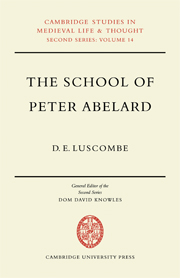Book contents
- Frontmatter
- Contents
- Preface
- List of Abbreviations
- I The Literary Evidence
- II Abelard's Followers
- III The Diffusion of Abelardian Writings
- IV The Condemnation of 1140
- V The Theological Writings of Abelard's Closest Disciples
- VI The School of Laon
- VII Hugh of St Victor
- VIII The Summa Sententiarum
- IX Abelard and the Decretum of Gratian
- X Abelard's Disciples and the School of St Victor
- XI Peter Lombard
- XII Robert of Melun
- XIII Richard of St Victor
- XIV Conclusion
- Appendices
- Bibliography
- Index of Manuscripts
- General Index
- Frontmatter
- Contents
- Preface
- List of Abbreviations
- I The Literary Evidence
- II Abelard's Followers
- III The Diffusion of Abelardian Writings
- IV The Condemnation of 1140
- V The Theological Writings of Abelard's Closest Disciples
- VI The School of Laon
- VII Hugh of St Victor
- VIII The Summa Sententiarum
- IX Abelard and the Decretum of Gratian
- X Abelard's Disciples and the School of St Victor
- XI Peter Lombard
- XII Robert of Melun
- XIII Richard of St Victor
- XIV Conclusion
- Appendices
- Bibliography
- Index of Manuscripts
- General Index
Summary
The twelfth century was notable for the activity which preceded and achieved the appearance of several books which came to be accepted as classical and standard manuals of the subjects of which they treated: the Dccretum of Gratian, the Summa super Priscianum of Peter Helyas, the History of Peter Comestor, the Sentences and the Gloss of Peter Lombard. Abelard did not become such an authority even in logic or on account of his Sic et Non. His teaching, although wide ranging, was not everyone's guide to the sum of theological or logical knowledge. Nor could Abelard be accepted as an authoritative representative of faith. His scholarship and his mastery of source materials as well as his opinions caused his work to be remembered and consulted by the most prominent of his successors in the schools, but the condemnations had made clear that his teaching was to lack episcopal approval.
Abelard knew, perhaps better than his critics, that he was less a teacher of truth than an analyst and a reviewer of formulae and of the mass of auctoritatcs. His Confession of faith to Heéloïse is a touchstone of his sincerity to uphold the teaching of Christ and the Apostles but in understanding that teaching he was most concerned to reveal and to elucidate problems, to reorganize the vocabulary of thought and to highlight what had been neglected or exaggerated among the themes contained in Scripture and the Fathers. He is ‘one whose infallible instinct leads straight to dangerous questions and provoking replies’. The challenge contained in such enquiries when cultivated by an intelligence of Abclard's power is an unusually demanding one in any academic society.
- Type
- Chapter
- Information
- The School of Peter AbelardThe Influence of Abelard's Thought in the Early Scholastic Period, pp. 308 - 310Publisher: Cambridge University PressPrint publication year: 1969

